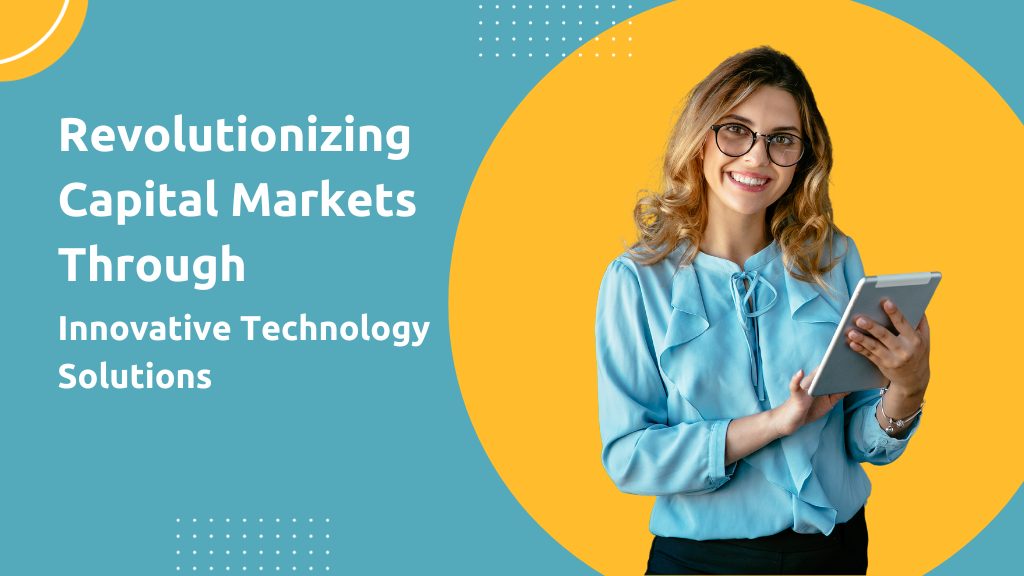Introduction
The capital markets industry has traditionally been slow to adopt new technologies. However, the pace of technology innovation in capital markets has accelerated over the past few years and will continue to accelerate. This is due in large part to the emergence of cloud computing, artificial intelligence (AI), machine learning (ML), big data analytics, blockchain, and distributed ledger technology (DLT) as well as regulatory changes such as MiFID 2 and Dodd-Frank Act. Capital markets firms are starting to use these technologies more frequently but there is still much work needed on both sides of the market for this transformation to be fully realized.
The Evolution of Capital Markets
The evolution of capital markets has been nothing short of revolutionary.
In a relatively short period of time, they have gone from being highly centralized, closed systems to dynamic and open networks that allow investors to access information and trade securities anywhere in the world using their smartphones or computers. The internet has transformed the way we work, play, and socialize and it has also transformed the way we invest. As a result, the need for expert capital markets consulting services has never been greater to navigate this rapidly changing landscape.
The Role of Technology in Capital Markets
The role of technology in capital markets is a topic that has been debated for decades. The growth of the internet and advances in technology have allowed new players to enter the space, giving investors more choices than ever before.
The traditional financial services industry has slowly started adopting some aspects of these new technologies, but it hasn’t been enough to keep up with competitors who are embracing these tools wholeheartedly. This means there is a huge opportunity for anyone who wants to innovate within this market and that includes you!
Blockchain and Distributed Ledger Technology
Blockchain and distributed ledger technology (DLT) are two buzzwords that have been floating around the financial industry for quite some time now. Many people are still unsure as to what these terms mean, so let’s break it down for you:
Blockchain is the underlying technology behind cryptocurrencies such as Bitcoin. It’s essentially a digital ledger that records transactions between parties without the need for an intermediary or central authority. The “blocks” in blockchains represent batches of data being stored together on nodes across multiple computers around the world this makes it secure because there’s no one single place where all your information is stored; instead, every node has access to all parts of the chain at once!
DLT refers more broadly than just blockchain; it includes any kind of distributed database system where information can be securely shared across multiple sites within an organization while still maintaining privacy and confidentiality between those sites – think bank vaults vs. safes!
Companies can leverage vara license application help services to streamline the licensing process, ensure data security, and offer clients transparent, real-time updates on their application status.
Artificial Intelligence and Machine Learning

Artificial intelligence and machine learning (AI/ML) are helping to automate processes, making them more efficient and accurate. AI can be used to make predictions about the future, optimize processes, create new products and services, and ultimately help you make better decisions.
This technology is revolutionizing capital markets in a number of ways:
Automation
By automating tasks that were once done manually by humans such as data entry or calculations AI allows companies to do more work with fewer resources. This saves time and money while improving accuracy by eliminating human error from these repetitive tasks.
Prediction
AI systems can learn from past experiences in order to predict future outcomes based on patterns identified during the training phase(s). For example, an autonomous vehicle may use object detection algorithms trained on millions of images containing cars before driving safely down city streets without hitting any pedestrians!
Generate More Leads With Website & Messenger Chatbots
Gather quality leads on autopilot and 10x your ROI with automated chats
Big Data Analytics
Big data analytics is the process of discovering and analyzing hidden patterns in large volumes of data. It is used for a variety of applications including fraud detection, marketing, IT operations, and customer relationship management (CRM).
Data mining uses statistical techniques to find relationships between variables in the data set by looking for clusters or groups within it. Data mining algorithms can also be used to predict an outcome based on previous outcomes as well as other information such as demographics or geographic location.
Cloud Computing
Cloud computing is the use of a network of remote servers hosted on the Internet to store, manage, and process data.
Cloud computing can be used for many different applications including financial services and capital markets. It allows users to access their data from any location at any time, which makes it easier for them to collaborate across geographic boundaries. For example, if you have employees who work remotely or travel frequently for business purposes, you can use cloud-based solutions so that they have access to their information even when they’re not in the office.
In addition to making it easier for employees who travel frequently or work remotely, another benefit of using cloud computing solutions is increased security against cyberattacks because there’s no need for local storage devices such as laptops or thumb drives that might get lost or stolen by hackers trying to penetrate into your system through these types devices (or worse yet your employees themselves!).
Automation and Robotic Process Automation (RPA)
RPA is a technology that enables businesses to automate repetitive tasks and processes. It’s often used for back-office operations, but can also be applied to front-end functions that involve interacting with customers.
RPA is a way to improve efficiency, reduce costs, and increase profitability. It helps organizations achieve their goals faster than ever before by automating manual processes through software robots that mimic human behavior. These virtual workers help you get more done with fewer resources so you can focus on what matters most: serving your customers better than anyone else does!
Cybersecurity in Capital Markets
Cybersecurity is a major concern for capital markets. It’s estimated that cybercrime costs the financial industry $500 billion annually and has become one of the top three risks faced by banks, insurers, and asset managers according to leading industry associations such as Aite Group and FISMA (Financial Services Information Sharing & Analysis Center).
In recent years we’ve seen an explosion in the number of cyberattacks against financial institutions from JPMorgan Chase’s massive data breach in 2014 to more recent attacks on Capital One Financial Corp., State Street Corp., Bank of America Corp., Citigroup Inc., Wells Fargo & Co., HSBC Holdings Plc., Deutsche Bank AG and others. These incidents have highlighted just how vulnerable our financial systems remain despite all their protections against fraudsters trying to steal money from accounts or steal identities through social media accounts linked with bank accounts (which often contain personal information like birthdays).
Regulatory Challenges and Compliance
Regulatory challenges and compliance are two major issues facing the financial services industry today. Regulatory requirements have increased significantly over the years, making it harder for companies to stay compliant with all applicable laws. For example, in 2017 alone there were over 4,500 regulatory changes and more than 1 million new rules issued by regulators worldwide. This is an increase from 2016 when there were 3,500 regulatory changes and 800 new rules issued by regulators worldwide (Source: PWC).
Compliance refers to an organization’s ability to meet all applicable laws and regulations while maintaining its values as an organization (e.g. boost customer service). In order for a company or business unit within an organization to be considered compliant with relevant regulations they must first understand what their legal requirements are so they can identify how their activities impact other areas such as customer experience or risk management practices within those areas where compliance may not necessarily apply directly but could still impact outcomes indirectly through other actions taken within those same spaces where compliance isn’t directly required either due diligence process would include identifying these potential impacts before proceeding further along into any project cycle including planning budgeting etcetera.
Future Trends in Capital Markets Technology
The world of capital markets is undergoing a rapid transformation, driven by new technologies such as blockchain and distributed ledger technology (DLT), artificial intelligence (AI), machine learning, big data analytics, and cloud computing. These innovations are transforming the way we do business; they will also have significant impacts on financial services companies’ operating models.
While these advancements offer tremendous opportunities for firms to improve efficiency, productivity, and cost savings while reducing risk exposure and compliance costs – they also present challenges that must be addressed head-on if they are going to realize their full potential. In particular:
- Regulatory challenges: Capital markets regulators around the globe are working hard to develop frameworks that enable innovation while protecting investors from harm caused by risky products;
- Compliance requirements: While many businesses focus primarily on improving operational efficiencies through automation tools like robotic process automation (RPA) or artificial intelligence software bots – there are still very few organizations able to demonstrate full compliance with all applicable regulations at all times
Conclusion
Capital markets have been slow to adopt new technology, but the industry is beginning to embrace change. Blockchain is expected to revolutionize capital markets by providing a more secure and efficient system for trading securities. The technology can also streamline processes such as clearing and settlement, which will lead to faster transactions with fewer errors than traditional methods of exchanging assets.
Are You Ready To SkyRocket Your Business With Our AI Chatbots
Click The Button Below And Gather Quality Leads With Botsify

